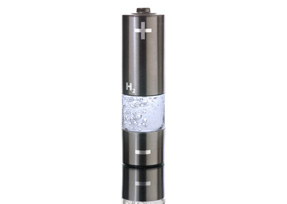What is a fuel cell?
A fuel cell is a device that generates electricity that can be used to power lights, motors, and other appliances. The fuel cell has a positive electrode called an anode and a negative electrode called a cathode. The reaction that produces electricity involves oxygen and hydrogen, with heat released as a byproduct.
How does a fuel cell work?
Hydrogen is channeled into the anode of the fuel cell. Aided by a catalyst that increases the speed of the reaction at the electrode, the hydrogen atoms are split. The protons travel through the electrolyte membrane while electrons travel through a circuit to generate electricity. Naturally circulating oxygen in the air enters through the cathode and mixes with the protons and electrons. The result of this interaction is the production of electricity and the byproducts are water and heat.
What are the advantages of fuel cells?
-
Fuel cells generate no pollution or toxic waste since the main byproduct is water.
-
They use hydrogen as fuel for operation, which is a common substance easily available anywhere on earth.
-
The operation of fuel cells is quiet and therefore they can be used in residential areas or other zones where noise pollution is a concern.
-
Fuel cells are a compact source of high-density energy. They can be used in places where space constraints are a consideration.
-
There is no combustion involved since chemical energy is converted directly into electricity. The conversion process is highly efficient.
-
There are no moving parts to care for or potentially repair so maintenance of fuels cells is simple.
What are the disadvantages of fuel cells?
-
Fuel cells are not yet cost effective enough to replace conventional power generation methods. Installed fuel cell systems can run $5,000 per kilowatt while most energy developers are looking to spend no more than $1,500 at a maximum.
-
While readily available, hydrogen is prone to combustion and therefore, dangerous to handle. It is also not easy to store hydrogen in a tank.
-
The hydrogen used in the reaction needs to be a pure source. Obtaining pure hydrogen requires investing large amounts of money to extract hydrogen from appropriate sources like natural gas or water.
-
Fuel cells are still in the earlier stages of development so those who commit to using it now will be taking a risk.
...Read more
Close










